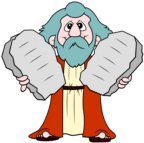






![]()
 A review of the torah by Moses Maimonides (Rambam) produced a list of 613 Commandments. There are 365 negative commandments and 248 positive commandments. Some are related to temple service and as of 70 A.D. there is no functional temple in Jerusalem. Therefore, no person can obey or fulfill all of the 613 commandments no matter how hard they try.
A review of the torah by Moses Maimonides (Rambam) produced a list of 613 Commandments. There are 365 negative commandments and 248 positive commandments. Some are related to temple service and as of 70 A.D. there is no functional temple in Jerusalem. Therefore, no person can obey or fulfill all of the 613 commandments no matter how hard they try.
Jesus has often been criticized for what many view as trying to do away with the law. When He was asked which of the laws was the greatest of them all Jesus replied:
But when the Pharisees heard that Jesus had silenced the Sadducees, they gathered themselves together. One of them, a lawyer, asked Him a question, testing Him, “Teacher, which is the great commandment in the Law?” And He said to him, “ ‘You shall love the Lord your God with all your heart, and with all your soul, and with all your mind.’ “This is the great and foremost commandment. “The second is like it, ‘You shall love your neighbor as yourself.’ “On these two commandments depend the whole Law and the Prophets” (Matthew 22:34-40).
 Jesus is referring to Deuteronomy 6:5 and Lev. 19:18. If you try to do these two commandments then the other commandments will fall in place. For example, anyone who loves his neighbor as themselves would never steal from them. Notice that both of these two commandments include the word love. Our God is a God of love.
Jesus is referring to Deuteronomy 6:5 and Lev. 19:18. If you try to do these two commandments then the other commandments will fall in place. For example, anyone who loves his neighbor as themselves would never steal from them. Notice that both of these two commandments include the word love. Our God is a God of love.
Once there was a gentile who came before Shammai, and said to him: Convert me on the condition that you teach me the whole Torah while I stand on one foot. Shammai pushed him aside with the measuring stick he was holding. The same fellow came before Hillel, and Hillel converted him, saying: "That which is despicable to you, do not do to your fellow, this is the whole Torah, and the rest is commentary, go and learn it." Babylonian Talmud, Shabbat 31a
Here, Hillel, perhaps the most respected opinion of any of the authors in the talmud, condenses the law into one commandment. This was done around 50 years or so BEFORE the Messiah came.
The Torah (as explained in the Talmud - Sanhedrin 58b) presents seven mitzvot (good deeds or commandments) for non-Jews to observe.
Maimonides, explains that any human being who faithfully observes these laws earns a proper place in heaven. So you see, the Torah is for all humanity, no conversion necessary.(1)
Here the Torahs 613 Commandments have been reduced to 7.
When Adam and Eve were in the Garden of Eden they had only one commandment to keep. To not eat from the tree of the knowledge of good and evil (Gen. 2:7). Yet, man was unable to keep even one commandment. Having commandments in place should serve one primary purpose. To show us our inability to do right all the time and our need for forgiveness from God.
Perhaps Isaiah said it best when he said "All our righteousness is like filthy rags" (Isaiah 64:6).
1). http://www.aish.com/wallcam/7_noachide_laws.asp